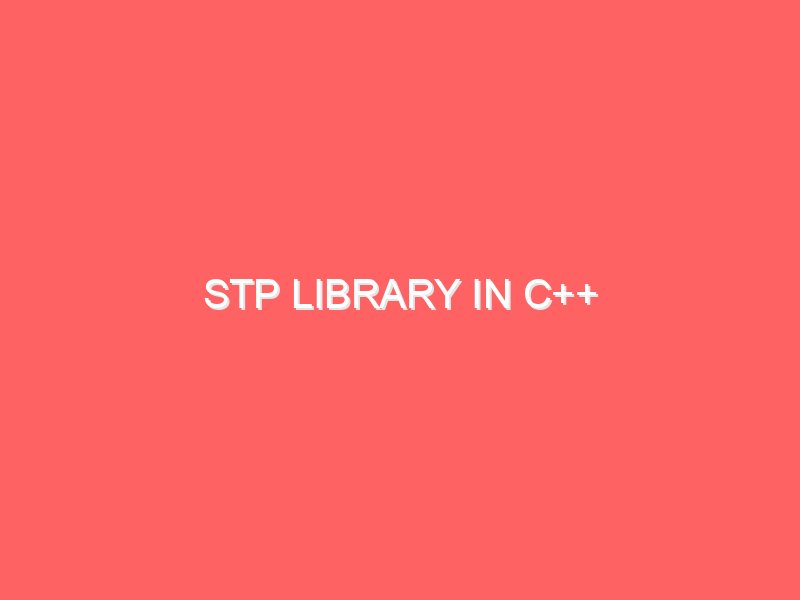Introduction to the STP Library in C++
The Standard Template Library (STP) in C++ is a powerful set of C++ template classes to provide general-purpose classes and functions with templates that implement many popular and commonly used algorithms and data structures like vectors, lists, queues, and stacks. This library is a vital part of C++ programming and has significantly changed how developers approach code efficiency and reusability.
In this article, we will explore the STP Library in C++ in detail. We will look at its components, how to use them, and why they are important. We will also cover some common myths and fun facts about the STP Library. This comprehensive guide aims to give you deep insights and practical knowledge to effectively use the STP Library in your C++ projects.
The Components of the STP Library
The STP Library is composed of several components, each designed to simplify various programming tasks. These components include:
- Containers: Data structures like vectors, lists, queues, and stacks.
- Algorithms: Functions to perform various operations on data structures like searching, sorting, and modifying.
- Iterators: Objects that point to elements in containers, allowing traversal of container elements.
- Functors: Objects that can be treated as though they are a function or function pointer.
Containers
Containers are objects that store collections of other objects. They are the cornerstone of the STP Library. Here are the main types of containers:
1. Vector
A vector is a dynamic array that can change its size automatically when elements are added or removed. It provides fast random access to elements but can be slower when inserting or deleting elements compared to other containers like lists.
#include <vector>
#include <iostream>
int main() {
std::vector<int> vec = {1, 2, 3, 4, 5};
vec.push_back(6);
for (int i : vec) {
std::cout << i << " ";
}
return 0;
}
2. List
A list is a sequence container that allows non-contiguous memory allocation. Unlike vectors, lists allow fast insertions and deletions, but accessing elements is slower because it requires sequential traversal.
#include <list>
#include <iostream>
int main() {
std::list<int> lst = {1, 2, 3, 4, 5};
lst.push_back(6);
for (int i : lst) {
std::cout << i << " ";
}
return 0;
}
3. Deque
A deque (double-ended queue) allows fast insertions and deletions at both the beginning and end. It is more complex than a vector but can be more efficient for certain operations.
#include <deque>
#include <iostream>
int main() {
std::deque<int> deq = {1, 2, 3, 4, 5};
deq.push_front(0);
deq.push_back(6);
for (int i : deq) {
std::cout << i << " ";
}
return 0;
}
4. Set and Map
Sets are containers that store unique elements following a specific order. Maps store key-value pairs where each key is unique.
#include <set>
#include <map>
#include <iostream>
int main() {
std::set<int> st = {1, 2, 3, 4, 5};
st.insert(6);
std::map<int, std::string> mp;
mp[1] = "one";
mp[2] = "two";
for (int i : st) {
std::cout << i << " ";
}
std::cout << std::endl;
for (auto const& pair : mp) {
std::cout << pair.first << " = " << pair.second << std::endl;
}
return 0;
}
Algorithms
Algorithms are functions that perform specific operations on containers. They include searching, sorting, counting, and manipulating elements. Here are some common algorithms:
1. Searching
#include <algorithm>
#include <vector>
#include <iostream>
int main() {
std::vector<int> vec = {1, 2, 3, 4, 5};
if (std::binary_search(vec.begin(), vec.end(), 3)) {
std::cout << "Found!" << std::endl;
} else {
std::cout << "Not Found!" << std::endl;
}
return 0;
}
2. Sorting
#include <algorithm>
#include <vector>
#include <iostream>
int main() {
std::vector<int> vec = {5, 3, 1, 4, 2};
std::sort(vec.begin(), vec.end());
for (int i : vec) {
std::cout << i << " ";
}
return 0;
}
3. Counting
#include <algorithm>
#include <vector>
#include <iostream>
int main() {
std::vector<int> vec = {1, 2, 3, 3, 3, 4, 5};
int count = std::count(vec.begin(), vec.end(), 3);
std::cout << "Number of 3s: " << count << std::endl;
return 0;
}
Iterators
Iterators are objects that enable a programmer to traverse through the elements of a container. They provide a way to access elements without exposing the underlying structure of the container. There are different types of iterators:
- Input Iterators: Used to read from a container.
- Output Iterators: Used to write to a container.
- Forward Iterators: Can be read and written but only in a forward direction.
- Bidirectional Iterators: Can be read and written in both forward and backward directions.
- Random Access Iterators: Can be read and written in any order.
Here’s an example using iterators:
#include <vector>
#include <iostream>
int main() {
std::vector<int> vec = {1, 2, 3, 4, 5};
std::vector<int>::iterator it;
for (it = vec.begin(); it != vec.end(); ++it) {
std::cout << *it << " ";
}
return 0;
}
Functors
Functors, or function objects, are objects that can be used as though they are a function or function pointer. They can store state information between calls. Functors are particularly useful in situations where simple functions need to be used as arguments to algorithms.
#include <iostream>
#include <algorithm>
#include <vector>
class MultiplyBy {
public:
MultiplyBy(int n) : factor(n) {}
int operator()(int x) const { return x * factor; }
private:
int factor;
};
int main() {
std::vector<int> vec = {1, 2, 3, 4, 5};
std::transform(vec.begin(), vec.end(), vec.begin(), MultiplyBy(3));
for (int i : vec) {
std::cout << i << " ";
}
return 0;
}
Why Use the STP Library?
The STP Library in C++ offers several advantages that make it an essential part of modern C++ programming:
- Efficiency: STP algorithms and containers are highly optimized for performance.
- Reusability: Using standard components reduces the need to write custom data structures and algorithms.
- Maintainability: Code written using STP is easier to read and maintain due to its standardized approach.
- Portability: STP is a part of the C++ Standard Library, making it available on any standard-compliant C++ compiler.
Common Myths about the STP Library
Myth 1: STP is Slow
Busted: The STP Library is designed for efficiency. While certain operations may have overhead compared to hand-tuned code, the library provides a balance between performance and ease of use. In most cases, the performance difference is negligible.
Myth 2: STP is Hard to Use
Busted: While it may seem complex at first, the STP Library is quite straightforward once you understand its components. Many resources and documentation are available to help you get started.
Myth 3: Only Suitable for Small Projects
Busted: The STP Library is suitable for projects of all sizes. It is used in many large-scale applications and is an integral part of many modern C++ codebases.
Fun Facts about the STP Library
- Inspired by Ada: The design of the STP Library was influenced by the Ada programming language, which also features generic programming.
- Concepts Proposal: The idea of concepts, which helps in defining the interfaces that template parameters must satisfy, was initially part of the STP but was later removed due to complexity. It reappeared in C++20.
- Boost Library: Many of the features and components of the STP Library were first prototyped in the Boost Library, a collection of peer-reviewed portable C++ source libraries.
References
To dive deeper into the STP Library, consider exploring the following books:
- “The C++ Standard Library: A Tutorial and Reference” by Nicolai M. Josuttis: This book provides a comprehensive tutorial and reference to the STP Library, covering all its components in detail.
- “Effective STL: 50 Specific Ways to Improve Your Use of the Standard Template Library” by Scott Meyers: This book focuses on best practices for using the STP Library effectively.
- “C++ Primer” by Stanley B. Lippman, Josée Lajoie, and Barbara E. Moo: This book offers an introduction to C++ and its standard library, including the STP components.
Conclusion
The STP Library in C++ is a powerful tool that can greatly enhance the efficiency, reusability, and maintainability of your code. By understanding and leveraging its components—containers, algorithms, iterators, and functors—you can write more efficient and readable C++ programs. Busting the myths surrounding the STP Library and appreciating its fun facts can also make learning and using it a more enjoyable experience.
At Emancipation Edutech Private Limited, we are committed to providing comprehensive training on C++ and its libraries. Our courses are designed to equip you with practical skills and deep knowledge, ensuring you are well-prepared to tackle real-world programming challenges. Explore our offerings and join our community of tech enthusiasts to take your coding skills to the next level.
For more information, visit our website or contact us at:
Emancipation Edutech Private Limited
Abhinandan Complex, Tharpakhna, Near Govt. Women’s Polytechnic, Ranchi, Jharkhand.
Contact Number: +919264477176
Website: Emancipation Edutech
Email: teamemancipation@gmail.com



